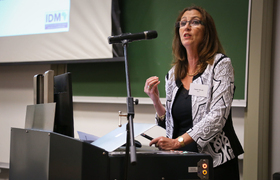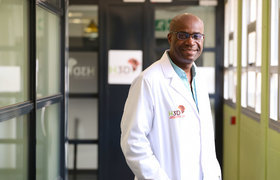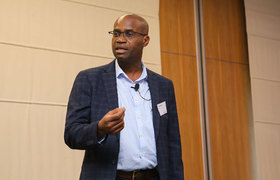Prof Chibale elected to prestigious US National Academy of Sciences
07 May 2025 | Story Myolisi Gophe. Photo Je’nine May. Read time 4 min.
Professor Kelly Chibale, one of Africa’s leading scientists in the field of drug discovery, has been elected as an international member of the United States (US) National Academy of Sciences (NAS), one of the highest honours in the global scientific community.
Professor Chibale, the Neville Isdell Chair in African-centric Drug Discovery & Development at the University of Cape Town (UCT), was among 30 international members elected this year, alongside 120 US-based scientists. His election recognises his “distinguished and continuing achievements in original research”, particularly in the development of treatments for diseases that disproportionately affect African populations.
The announcement, made by the NAS last week, brings the total number of international members to 556. International members are non-voting and hold citizenship outside the US.
The NAS is a private, nonprofit institution that was established under a congressional charter signed by President Abraham Lincoln in 1863. It recognises achievements in science by election to membership, and provides science, engineering, and health policy advice to the federal government and other organisations.
“This recognition is a great honour and a responsibility.”
“I was working a night shift on 29 April when an email from a US colleague popped up at 20:15, replying to a message I sent back in 2021,” Chibale recalled. “The message simply read, ‘I just wanted to say congratulations on being elected to the US National Academy of Sciences!!’ I thought he’d made a mistake and was referring to my election to the National Academy of Medicine last October. But then the congratulatory emails started pouring in. That’s when I realised it was real breaking news. Apparently, my US colleagues had learnt about my election that afternoon, US time.”
Trailblazer
Chibale’s latest honour follows closely on his 2024 election into the US National Academy of Medicine, making him one of the few African scientists to be recognised by both prestigious institutions.
A trailblazer in his field, Chibale is the founder and director of the Drug Discovery and Development Centre (H3D), Africa’s first centre of such kind, housed at UCT’s Department of Chemistry and the Institute of Infectious Disease and Molecular Medicine. Under his leadership, H3D has spearheaded several groundbreaking initiatives, including the discovery of the first small-molecule clinical candidate for any disease researched on African soil by an African-led team.
“I intend to contribute meaningfully to the academy’s mission, advising on science matters and helping shape science policy.”
“This recognition is a great honour and a responsibility,” he said. “I intend to contribute meaningfully to the academy’s mission, advising on science matters and helping shape science policy. I also want to bring prominence to scientific entrepreneurship. Science should not only satisfy curiosity but also drive development and create jobs.”
Reflecting on his amazing journey as a leading scientist, Chibale said there are no formulas for success. “I’ve always believed in making the most of every opportunity, staying consistent, and using my God-given talents. Challenges are inevitable, but I see them as opportunities.”
He emphasised the importance of investing in basic science research and supporting the next generation of African science entrepreneurs. “Young scientists need to be incentivised to think entrepreneurially. Supporting young basic scientists better, ensuring their career progression and supporting scientific entrepreneurship can help move the African continent forward. In a world that is increasingly polarised, science is a unifier,” he said. “It knows no boundaries and belongs to all of humanity.”
 This work is licensed under a Creative Commons Attribution-NoDerivatives 4.0 International License.
This work is licensed under a Creative Commons Attribution-NoDerivatives 4.0 International License.
Please view the republishing articles page for more information.










